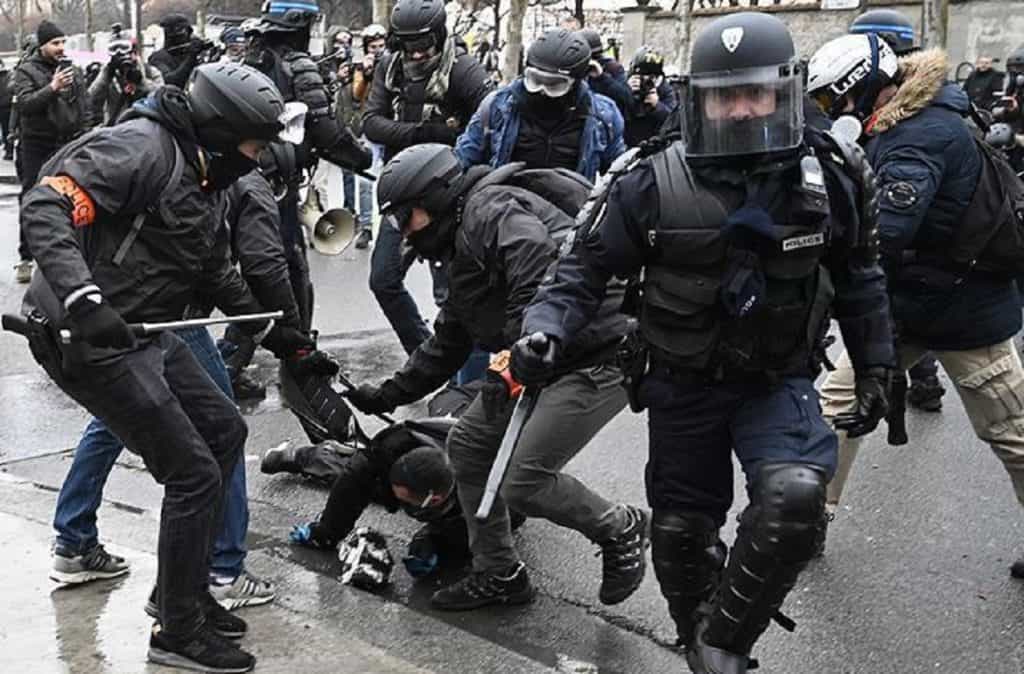By María Isabel Niño-Rada
Police forces all over the world are institutions designed to maintain security and order within societies with preferably a preventive character, in order to use different civic and social tools and only recurring to the use of force as a last resort to reestablish public order.
 Since police forces are under the State’s orders, some academic approaches consider that the police functions have to do with the repressive apparatus of states to maintain order through violence, which doesn’t eliminate crime but perpetuates criminal conducts inside societies.
Since police forces are under the State’s orders, some academic approaches consider that the police functions have to do with the repressive apparatus of states to maintain order through violence, which doesn’t eliminate crime but perpetuates criminal conducts inside societies.
The term “police brutality” is sometimes used to refer to various human rights violations by police. This might include beatings, racial abuse, unlawful killings, torture, or indiscriminate use of riot control agents at protests. At its worst, unlawful use of force by police can result in people being deprived of their right to life. If police force is unnecessary or excessive, it may also amount to torture or other ill-treatment. Unlawful force by police can also violate the right to be free from discrimination, the right to liberty and security, and the right to equal protection under the law.
Many people believe that in any circumstance, police forces are allowed to kill people, which is not true. There are strict international laws and standards governing how and when police can use force and particularly lethal force. The UN Basic Principles on the Use of Force and Firearms by Law Enforcement Officials (BPUFF) is the key international instrument that deals with police use of force.
This document states that law enforcement officials have a vital role in the protection of the right to life, liberty and security of the person, as guaranteed in the Universal Declaration of Human Rights and reaffirmed in the International Covenant on Civil and Political Rights and they shall minimize damage and injury, and respect and preserve human life. This means that it is the utmost obligation of state authorities, including police, to respect and protect the right to life. However, many killings by the police around the world clearly do not meet this criteria.
The Small Arms Survey says that in each year between 2007 and 2012, an estimated 19,000 people were killed during ‘legal interventions’ (encounters with police). In countless other cases, police are quick to use force in response to protests or demonstrations. Throughout 2019 and 2020, Hong Kong police have repeatedly deployed weapons like tear gas and rubber bullets in an unlawful way against protesters.
Here are some examples:
– In 2019 police in Rio de Janeiro, Brazil, killed 1,810 people – an average of five per day
– In 2019, Kenyan police killed 122 people
– Between October 2019 and January 2020, police in Iraq killed around 600 protesters
– Between 2015 and 2018, over 500 people were fatally shot by the police in Jamaica, and over 300 shot and injured
– Around 1000 people are killed by police in the USA every year.
– In 2017, authorities in the Russian republic of Chechnya unleashed a wave of attacks on people believed to be gay or lesbian. Dozens of gay men in Chechnya were abducted and tortured. Many were killed at secret detention sites.
– In the Dominican Republic, sex workers, and especially Trans women who are sex workers, face appalling abuse at the hands of police including rape, beatings and humiliation.
The case of George Floyd, a 46-year old Black man who died after a police attack, sparked widespread protests across the USA and beyond, calling for the officers involved to be held accountable and systemic change in policing more broadly. The Human Rights Council adopted by consensus a resolution in which condemned the violent practices perpetrated by law enforcement agencies in this case.
The resolution also regrets recent incidents of excessive use of force by law enforcement officials against protesters. The High Commissioner for Human Rights, Michelle Bachelet, also mentioned that Emergency powers should not be a weapon of governments that want to wipe out dissent, control the population or even perpetuate themselves in power.
It is important to note that police reform is difficult to achieve in any country, because the police union and lobby strongly oppose oversight according to Sabrina Karim, assistant professor of government at Cornell University and international expert on police reform. Since police militarization has been growing, it has inevitably created a larger barrier for any meaningful dialogue between peaceful protests and political leaders. Her research has found that militarization decreases public trust in policing.
However, nobody is above the law, especially those who have a duty to uphold it. All cases of police use of lethal force should be subject to a thorough, independent, impartial and transparent investigation and if the evidence indicates that the killing was unlawful, the police officer responsible should be criminally prosecuted. On the other hand, governments have an obligation to ensure that everyone can enjoy the right to freedom of peaceful assembly, including through protests.
It is vital that police and other security forces around the world can improve their laws, policies and practices, under these recommendations made by Amnesty International:
– The power of the police to resort to the use of force and firearms must be adequately regulated by law
– The “protect-life” principle must be enshrined in law – lethal force may only be used for protecting against an imminent threat of death or serious injury
– Where use of force by the police has resulted in injury or death, there must be a prompt, thorough, independent, and impartial investigation. Those responsible must be brought to justice in fair trials
– During protests, police should be guided by their duty to facilitate peaceful assemblies, and their starting point should not be the use of force
– People in detention have the same rights as everybody else when it comes to lethal force
The most important thing is that people know what their rights are, and what police are, and are not allowed to do, to make sure that police stop using force against the law, and that those who kill unlawfully are brought to account without excuses.
Author: María Isabel Niño Rada (Professional Specialized in Presidential Council for Human Rights and International Affairs; Lawyer and professional in International Relations from the Universidad del Rosario, Colombia; Diploma in International Protection of the Human Rights of Women from the Universidad Austral, Argentina. She is currently enrolled in a Postgraduate degree in Constitutional Law at the Pontificia Universidad Javeriana. Bogotá D.C. Area, Colombia)
(The views expressed in this article belong only to the author and do not necessarily reflect the views of World Geostrategic Insights)
Image Credit: Anadolu Agency







